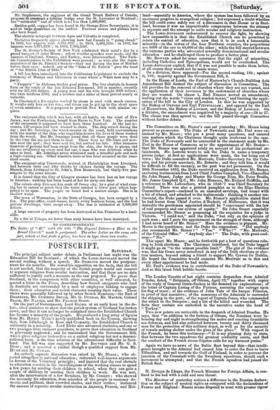The Committee on Mr. Stonor's case sat yesterday; Mr. Moore
being present as prosecutor. The Duke of Newcastle and Mr. Peel were ex- amined by Mr. Moore ; who put a great many questions, and entered into matters which the Chairman thought quite irrelevant to the case. The Duke of Newcastle said he concurred in the statement made by Mr. Peel in the House of Commons as to the appointment of Mr. Stonor- that Mr. Stoner was appointed solely on account of his professional at- tainments. Mr. Latrobe wrote to ask the Duke to name a temporary puisne judge : at first no applications were made the bar being out of town ; the Duke consulted Mr. Merivale, Under-Secretary for the Colo- nies, and his private secretary, Mr. Roberts ; and they told him it would be difficult to fill the vacancy, as the post was not permanent. On the 30th November 1863, the Duke received an application from Mr. Stoner, enclosing testimonials from Lord Chief Justice Campbell, Vice-Chancellor Sir John Stuart, Judge and Master Sir George Rose, Mr. Peter Brodie, Mr. James Campbell Q.C. Mr. John Measure, Mr. Richard Griffiths, and a reference to Mr. Labouchere, who in 1846-'7 was Chief Secretary for Ireland. There was also a printed pamphlet as to the Sligo Election Committee's report—enclosed in an unsealed envelope, tied round with a bit of riband, and attached to the testimonials : thinking it another tes- timonial, the Duke passed it over. Mr. Stonor's application stated that he had learnt from Chief Justice A'Beckett, of Melbourne, that it was desirable the gentleman appointed should be "conversant with the law of real property and our system of equity." Sir John Stuart especially recommended Mr. Stoner as p _all the requisites for a judge in. Victoria. "I could not," said the D e, "but rely on the opinions of such men ; and I gave the appointment on the strength of them, although I had never heard of Mr. Stoner." Here the evidence is piquant. Mr. Moore is the questioner, and the Duke the respondent. "Did any.body else recommend Mr. Stoner ? " "Yes." "Who ?" "Mr. Menvale, of the Colonial Office." "Anybody else ? " The Duke, with great cool- ness—" No."
This upset Mr. Moore ; and he forthwith put a host of questions rela- ting to Irish elections. The Chairman interfered, but the Duke begged it might go on "to the utmost possible limit." The gist of the evidence' was, that his Grace never interfered in any of the Irish elections or elec- tion matters, beyond asking a friend to au rt Mr. Craven for Dublin. He hoped the Committee would examine r. Merivale as to this and every other appointment be had made. Mr. Peel's evidence was in corroboration of the Duke of Newcastle's. And so this latest Irish bubble bursts.


































 Previous page
Previous page